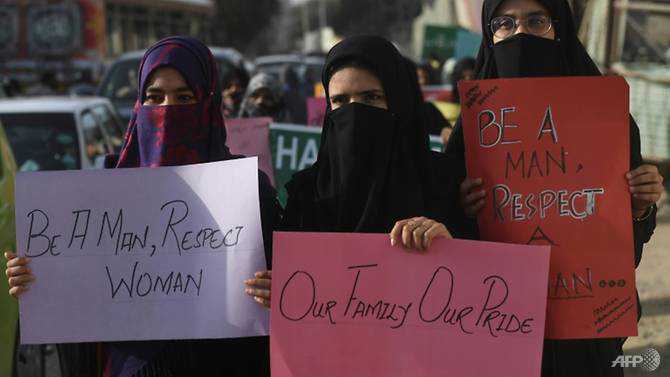Pakistan's 'biggest feminist' under fire after sexist tirade
07 March, 2020

He phone calls himself "Pakistan's biggest feminist", but soap-opera writer Khalil-ur-Rehman Qamar sparked a good national row this week after he hurled misuse at a women's rights activist on live tv set.
The invective-laden diatribe came simply days before thousands of people are anticipated to march in cities across Pakistan to mark International Women's Day, adding fuel to growing calls for greater freedoms in the ultra-conservative nation where pushback against such demands can often be vicious.
Qamar's tirade targeting activist Marvi Sirmed quickly went viral, highlighting Pakistan's acrimonious conversation around women's rights and cultural values.
While showing up on a tv set panel to discuss the upcoming Aurat (women's) march, Qamar took purpose at its slogan, "My own body, my choice".
He told Sirmed that "no-one would even spit on your body" - adding she was a good "cheap girl" who should "shut up".
Reaction was first swift, with local mass media giant Geo Entertainment - which recently signed Qamar to create soap operas - suspending his deal, while politicians and superstars condemned him on sociable media.
Drama critic Sadaf Haider told AFP that Qamar held "deeply misogynistic" sights that he wove into his soaps, arguing that such narratives are "not helping the reason for women's rights" found in Pakistan.
Qamar declined repeated requests for comment, even if he has appeared about other talk displays and refused to apologise, blaming Sirmed for interrupting him on air.
Pakistani soaps have been criticised for their depiction of feminine protagonists - often damsels on distress silently accepting abuse from their in-regulations and husbands, and that's proven as a strength.
Female villains are usually the opposite: They do not want to stay down, do not like to conform and wrap up creating concerns by seducing the virtuous heroine's husband.
While Qamar has come under fire for the bad portrayal of ladies in his soap operas, his latest function, "Meray Paas Tum Ho" ("I've you") broke viewership data in Pakistan.
WHOSE BODY?
The "my own body, my choice" slogan during last year's event made criticism in a Muslim country largely unaffected by the global #MeToo movement.
Organisers and participants were accused of promoting Western, liberal ideals and disrespecting religious and cultural sensitivities.
Some of the more provocative posters and slogans from the march discussing divorce, sexual harassment and menstruation drew a quick backlash and a slew of threats against the organisers.
Last month, anti-march campaigners filed a petition on Lahore to block this year's event, which is defined for Sunday.
Lawyer Azhar Siddique alleged it really is appearing funded by "various anti-state parties" with the purpose of sowing "anarchy" in world.
The judge ruled a ban would be unconstitutional, but warned marchers to avoid spreading "hate speech and immorality".
Another petition in Islamabad calling for a ban on the march was as well dismissed Friday.
Nighat Dad, area of the Aurat march organising committee, was unfazed by the backlash to prior events.
"The truth is, men like Khalil-ur-Rehman Qamar happen to be threatened, which is why they are coming up with all sorts of ridiculous arguments against the women's activity," she told AFP.
Women of all ages have long fought for basic rights found in Pakistan, where activists sometimes deal with harassment and threats for the work they do.
Sirmed, the activist, may have received multiple death threats.
In 2012, she escaped unharmed when unfamiliar assailants fired after her car. Her house was ransacked in 2018 and her notebook computers, passport and other travel documents were taken.
Amnesty International expressed support for the Aurat march, saying in a assertion that the "horrific threats of violence, intimidation and harassment of the marchers needs to stop".
Much of Pakistani society operates under a stringent code of "honour", systemising the oppression of ladies in matters like the right to choose who to marry, reproductive rights and even the right to an education.
According to estimates simply by the Honour Based Violence Recognition Network, at least 1,000 girls fall victim to honour killings in Pakistan every year.
Pakistan ranked a dismal 136 on the UN Expansion Programme's Gender Inequality Index found in 2018, doing worse than most of its South Asian neighbours.
Source:
